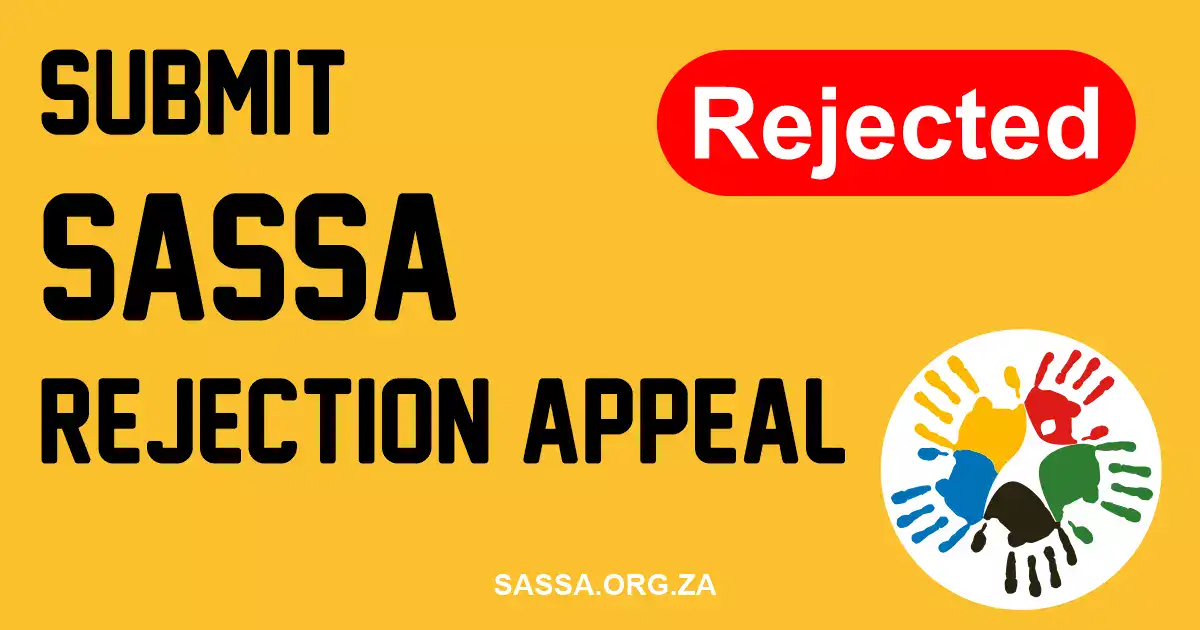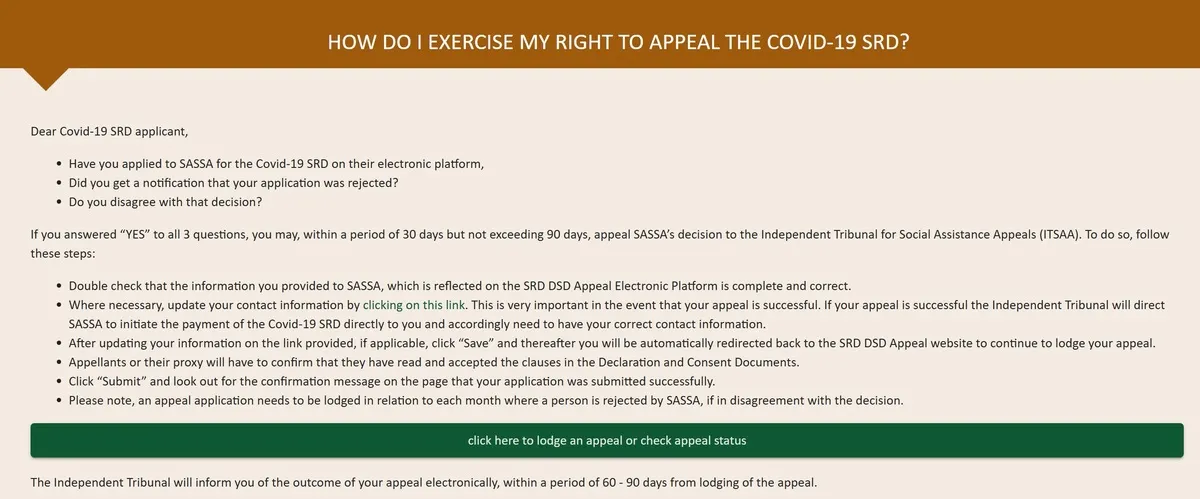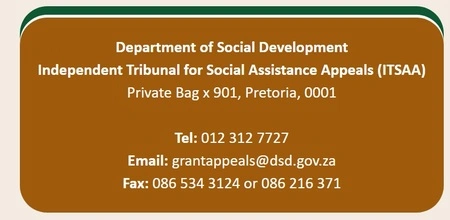SASSA Status Check Appeal – Submit SRD Appeal & Appeal Status Check

If your application for a SASSA social grant gets rejected, you have the right to appeal the decision within 60 to 90 days. Lodging an appeal gives SASSA the chance to re-evaluate your application if you believe you still meet the eligibility criteria, make sure to perform SASSA Status Check first.
Reasons Your SASSA Grant May Be Rejected

There are various reasons your initial grant application may be declined by SASSA, including:
- Your income exceeds the means test threshold set for the grant.
- Supporting documents submitted were insufficient, outdated, or could not be verified as authentic.
- SASSA could not validate your identity, citizenship, marital status, or other details provided.
- Medical assessment reports did not adequately confirm disability.
- Your application form was incomplete or completed incorrectly.
- Budgetary constraints meant the grant had reached the maximum number of approved applicants.
- You already received another social grant.
- Grant eligibility criteria were simply not met.
- Fraudulent information was detected on the application.
Submit SASSA SRD Appeal (Step-by-Step Process)
If you confirm your grant application was rejected but believe this decision was incorrect, swiftly follow this appeal process:
1. Obtain Appeal Form
- Visit your nearest SASSA regional office.
- Request a Social Grant Appeal Form from the Customer Service desk.
- Alternatively, download the Appeal Form from the SASSA website.
2. Complete Appeal Form
- Fully complete all sections of the SASSA Appeals Form.
- State the reason your grant application was rejected.
- Specify grounds for your appeal and why you believe you qualify.
- Indicate any additional evidence you are submitting to support your SASSA appeal.
3. Gather Supporting Documents
- Collect any new supporting documents, updated medical assessments, or supplementary evidence missing from your initial application.
- Get recent proof of income, disability evaluation, etc. Make copies.
- The stronger your evidence, the higher your appeal chances.
4. Submit SASSA Appeal In Person
- Return to the same SASSA regional office where you originally applied.
- Bring your green, barcoded ID book to verify your identity and submit the SASSA appeal yourself.
- Provide your fingerprints so your ID can be validated biometrically.
- Hand in your completed SASSA Appeal Form with all certified copies of supporting evidence.
- You will receive an SMS acknowledging receipt of your SASSA appeal.
5. Await Appeal Outcome
- Your SASSA appeal will be reviewed by the provincial Appeals Committee when they next convene.
- You will receive an SMS notification once your SASSA Status Check Appeal outcome has been decided.
- If the appeal is approved, grant processing proceeds. If declined, you will be informed of the reasons.
- The entire SASSA Status Check Appeal process can take up to several months from submission to final outcome.
Submitting your SASSA grant appeal promptly gives you the best chance of overturning the initial rejection.
Check Your SASSA Appeal Status
If it has been some time since you applied for your grant, first check what the outcome was before appealing:
Call or Email SASSA
Call the SASSA helpline at 012 312 7727 or your regional office number and request your current status. Alternatively, email [email protected] providing your ID number and application reference number from your receipt.
Check Online Portal
Log into your portal account at srd.sassa.gov.za/sc19/status or use online SASSA Status Check tool to view your application status.
Visit the Nearest SASSA Office
Take your ID book and visit the office where you submitted your application for them to look up and advise you of the status.
Review Status SMS
Check the mobile number you provided with your application for any SMS messages from SASSA indicating approved, pending, or rejected status.
Do not miss the SASSA appeal window. Confirm your application was declined before proceeding to appeal.

Tips for a Successful SASSA Appeal
Follow these important tips when lodging your appeal to help ensure a favorable outcome:
- Appeal as soon as possible within the 90-day window after rejection. Do not delay.
- Thoroughly complete the SASSA Appeals Form without leaving any fields blank.
- Specify detailed grounds explaining exactly why you believe you still qualify and deserve the grant.
- Submit recent medical assessments, income statements, residence proofs, or any other updated documents previously missing or inadequate.
- Provide evidence to dispute the exact reasons your original application was rejected.
- Stick to facts and focus on meeting the grant eligibility criteria point-by-point in your SASSA appeal motivation.
Submitting a strong, evidence-backed appeal case substantiating your qualification will boost your odds of success.
SASSA Appeal Outcomes
There are two possible outcomes once your grant appeal has been reviewed:
1. SASSA Appeal Approved
If your appeal is successful, you will receive an SMS from SASSA instructing you to visit your nearest local office within 5 working days to finalize and proceed with your grant application. The remaining details will be captured, verified, and approved.
Your grant will then start processing and you will receive regular grant payments provided you remain compliant with the grant requirements.
2. SASSA Appeal Declined
If your SASSA grant appeal is unsuccessful, you will receive an SMS notifying you of the outcome. The SMS will specify reasons explaining why your appeal was declined.
If your appeal is denied, you will unfortunately have to wait up to a year to reapply for the grant again from scratch.
There are limited options if your appeal is rejected. You may make a follow-up appointment at the SASSA office to discuss the reasons. But the decision is usually final unless there are exceptional circumstances.
Common Reasons for Failed SASSA Appeals
Some common reasons SASSA Appeals Committees decline appeals are:
- Supporting evidence and documents submitted were still insufficient or inadequate to verify details.
- Updated medical assessments still did not conclusively confirm permanent disability limiting ability to work.
- Income statements indicated household income still exceeded the means test threshold.
- Your circumstances had materially changed since the original application, meaning you were no longer eligible.
- Grant budget limits and quotas had already been reached.
- Submitted details could still not be authenticated and validated.
- Fraudulent information was detected.
Failing to submit a properly completed appeal with strong evidence generally leads to declined outcomes.
Special Considerations for Medical Appeal Outcomes
If your grant was rejected because your medical assessments did not adequately confirm your disability, take note of these tips when appealing:
- Ensure your doctor provides recent, detailed reports that clinically validate the nature and severity of your condition.
- Describe precisely how your disability impacts your daily functioning and ability to undertake work activities.
- Submit current supporting documentation like laboratory tests, diagnosis images, vision charts, hearing tests, etc. as quantitative proof of disability.
- Obtain second medical opinions from specialists like physiotherapists, psychiatrists, etc. where relevant.
- If you require assistive devices like crutches, braces, wheelchairs etc., highlight this in medical reports.
Providing current, ironclad medical evidence of disability gives your appeal the strongest prospects of success.
Can I Appeal Again After a Failed SASSA Appeal?
If your initial grant application appeal is declined, unfortunately, you cannot immediately appeal again. The decision of the Appeals Committee is considered final in most cases.
You will typically have to wait 12 months from the date of your appeal outcome notification before reapplying for the grant again from the start.
However, if there are exceptional circumstances or compelling new evidence emerges at a later stage, you can return to SASSA and formally request permission to submit a secondary appeal. But there is no guarantee it will be accepted and very few secondary appeals proceed.
In most cases, your best option after an unsuccessful SASSA Status Check Appeal is simply to reapply for the grant completely from scratch once the 12-month period lapses.
Reporting Corruption in the SASSA Appeals Process
If you witness or suspect any corrupt activities or nepotism during the SASSA appeals process, report this urgently by:
- Emailing [email protected]
- Calling the SASSA Anti-Fraud Hotline on 0800 601 011
- Visiting your nearest SASSA regional office and requesting to report corruption
- Filling in the online fraud report form on the SASSA website
- Phoning Crime Stop anonymously on 086 00 10111 to report social grant fraud
Malpractice compromises the fairness of the appeals system. Speak up if you encounter misconduct.
Getting Help Lodging Your SASSA Appeal

If you need assistance lodging an appeal for a rejected grant, contact:
- SASSA Call Centre – Call 012 312 7727 for guidance on starting an appeal.
- Legal Aid SA – Visit your local office for free legal help appealing your grant.
- SAPO Help Desks – Located in post offices, they can help explain and initiate the appeals process.
- Outreach Centres – Provide assistance with grant applications and appeals.
- Social/Community Workers – Can help you obtain, complete, and submit appeal forms and supporting documents.
Do not hesitate to ask for assistance from NGOs and social workers when appealing your grant.
FAQs about SASSA Appeal
How long do I have to appeal my rejected SASSA grant application?
You have 90 days from the date of rejection to submit an appeal to SASSA. Be sure to appeal as soon as possible within this window and not delay.
Where can I get the SASSA appeal forms?
You can obtain physical appeal forms from your nearest regional SASSA office. Alternatively, you can fill SASSA appeal forms online from the SASSA website.
What details must I include in the appeal form?
Fully complete all sections of the appeal form. Specify the reason your application was originally rejected. Explain in detail why you believe you still qualify and deserve the grant. Indicate what additional supporting documents you are submitting.
What documents must I submit with my SASSA appeal?
Provide any documents missing from your initial application, or updated versions of documents that were previously inadequate or rejected. This includes new medical assessments, income statements, residence proofs, ID copies, etc.
How do I submit my completed SASSA appeal?
You must submit the completed appeal form and supporting documents in person at the same regional SASSA office where you originally applied. Bring your green ID book and provide fingerprints so your ID can be verified biometrically.
What happens after I submit my appeal to SASSA?
You will receive an SMS acknowledging receipt of your appeal. It will be reviewed at the next provincial Appeals Committee meeting. You will then receive an SMS notification of the final appeal outcome. The entire process can take up to several months.
If my SASSA appeal is approved, what happens next?
If your appeal is successful, you will be instructed to visit your nearest SASSA office within 5 days to finalize and proceed with your grant application. Provided you remain compliant, your grant payments will then start processing.
Can I appeal again if my first appeal is declined?
Unfortunately, you cannot immediately appeal again if your initial appeal is rejected. You will have to wait 12 months before reapplying for the grant completely from scratch. However, in exceptional cases, you can request to submit a secondary appeal.
Where can I get help with my SASSA appeal?
You can contact the SASSA Call Centre, Legal Aid SA, SAPO Help Desks, outreach centers, and social workers for assistance lodging your SASSA grant appeal.
How do I report corruption in the SASSA appeals process?
Report any corruption or nepotism you experience by calling the SASSA fraud hotline, emailing [email protected], visiting your SASSA office, or contacting Crime Stop anonymously.
Final Thoughts on SASSA Appeal
The SASSA appeal process provides you with the chance to have your grant reassessed if you believe you still meet the eligibility criteria. Carefully complete the Appeals Form and provide updated evidence backing your qualification to maximize your odds of success. Submit supporting documents promptly within the 90-day window after rejection to avoid losing your right to appeal. Follow up diligently on the outcome and reapply from the start in the future if ultimately declined.
